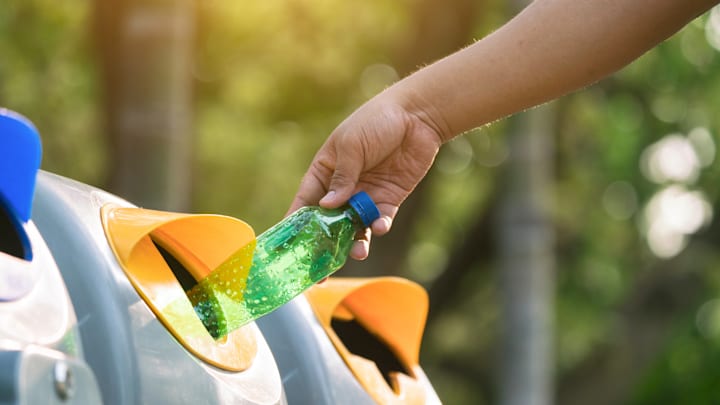The United States falls behind many of its peers when it comes to recycling. According to Yale University’s Environmental Performance Index (EPI), the U.S. ranks 105th in the world, recycling only an estimated 14.8 percent of eligible waste.
Much of this has to do with a lack of access to curbside recycling in some states, as well as a lack of common legislative incentives like bottle bills that mandate refunds for recycled bottles. However, the problem is also at a smaller scale: individual disinterest in recycling or misunderstandings of how to properly dispose of certain materials are partly to blame as well.
The Environmental Protection Agency (EPA) has instructions for recycling some of our most common materials, from plastics to electronics to even used oil. However, things can get complicated when each state has its own regulations about what can be recycled and how. Though it’s always worth double-checking your state and county rules regarding local procedures, you can find general guidelines below on some of the most commonly confusing items to recycle.
Pizza Boxes

In general, one of the most confusing pieces of garbage is pizza boxes. Can you recycle them or not? Surprisingly, the EPA says you can, even when they have grease on them, as long as you break them down flat. But in reality, that’s not always the case. A spokeswoman for the New York City Sanitation Department, for example, told The New York Times that while a small amount of grease isn’t an issue, if it seeps through the cardboard, the box becomes unrecyclable. So it’s better to err on the side of caution with a questionably dirty pizza box and recycle just the top.
Coffee Cups

Coffee cups also seem to be one of the biggest offenders when it comes to “aspirational recycling”—a.k.a., putting garbage in the wrong bin in the hope that it’ll be recycled. Most to-go coffee cups are lined with either plastic or polyethylene to make them waterproof. This has the unfortunate side effect of making most of them completely non-recyclable, contrary to popular belief. The different materials have to be separated, and most current recycling facilities aren’t capable of doing so.
Plastic Bags

Another common recycling error involves plastic bags. Banned in some states, they’re notorious for their negative environmental impact, especially in marine ecosystems. But you aren’t doing the environment any favors by throwing them in with your home recycling, sadly. Bags thrown in with the rest of your plastics can clog the machines at recycling centers, causing damage and slowing down the process. For this reason, most states ask that you don’t bag the rest of your recyclables, either. Instead, you can take your plastic bags to a collection location near you. Find the nearest one here.
What To Do if You Aren’t Sure
If you want to keep up with the latest changes in recycling laws across the United States, Waste Dive keeps an updated list dating back to 2022. Every time a new law is passed or signed, it gets added to the tracker, showing the shifting legislative landscape over the last several years when it comes to managing waste.
Looking specifically for results relevant to you? You can filter by a variety of factors, including state, type of policy, year of most recent action, materials involved in the bill, and its status. This way, you can keep up-to-date on all the recent developments in rules and regulations and do your part to help make the U.S. more sustainable.
Read More Live Smarter Stories:
